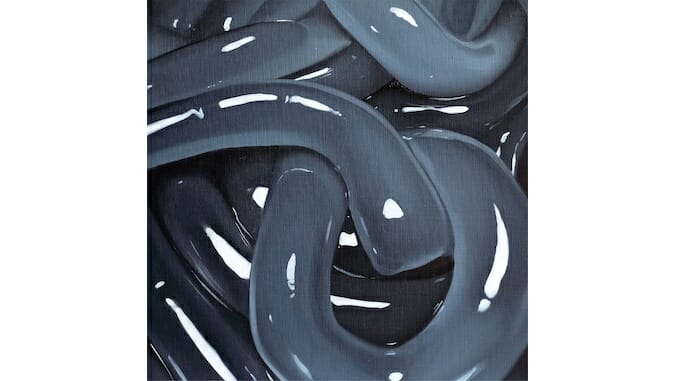Boris Show They May Never Run Out of Ideas on Experimental Shoegaze/Pop Hybrid W
Three decades and 40-plus albums in, the veteran Japanese trio's sonic footprint continues to sprawl.
Music Reviews Boris
It’s hard to think of a band more committed to exploring the entire heavy-music spectrum than Boris. It’s also hard to think of another band more committed to venturing outside that spectrum. With their latest album W, Boris continue to operate in both realms, as if their bountiful supply of inspiration hasn’t diminished at all over a prolific 30-year career. A delicate counterpoint to the harshness of 2020’s NO (“NO” combined with “W” spells “NOW”), W sublimates the metallic crunch that’s long been Boris’ calling card into a fog of shoegaze and experimental pop.
To say the least, crowd-pleasing hasn’t been Boris’ m.o, and their fans should know by now to expect the unexpected. Upon forming in 1992, the ravenously creative Japanese trio established their reputation with an audaciously unpolished brand of sludge metal that demanded endurance and patience in equal measure—pretty much exactly what you’d expect from a band that named themselves after a Melvins tune. Notably, Boris also wore their affinity for the heavy-drone style of bands like Earth on their sleeve. Their 1996 debut Absolutego, for example, consisted of a single hourlong track.
Two years later, when Boris named their sophomore album Amplifier Worship, they were, for all intents and purposes, being literal. For Boris, guitar distortion represents a kind of sacramental offering, a way of honoring an infinite quantum essence the band attempt to voice with every sound they make. Even at its noisiest (and its quietest, too), Boris’ music reflects a near-religious devotion to tonal variety. The band utilize guitars, in particular, as a palette of endless color choices, but they employ every other instrument—along with effects pedals, amps and mixing tricks—in much the same fashion.
Grateful Dead drummer Mickey Hart once famously wore a T-shirt with the words “God is sound” (an inversion of the Sanskrit saying Nada Brahma, “sound is God”). Boris fans might contend that God is tone—or vice versa. Either way, one gets the sense that, if we zoomed in on Boris’ music at the microscopic level, we would discover fractal-like patterns of detail. And it’s this attention to detail that unifies the band’s body of work in spite of their tendency to swerve erratically between noise, stoner rock, psych rock, post-rock, experimental, electronic, black metal, and un-ironic excursions into cheeseball pop and hard rock.
As W shows, lead guitarist/keyboardist Wata, bassist/rhythm guitarist Takeshi and drummer/programmer Atsuo can even run in myriad directions within the same genre. Highly digitized new tracks like “I Want to Go to the Side Where You Can Touch…” and “Icelina,” for example, function more like sound installations than traditional songs, bearing little in common with the band’s previous shoegaze-y work on albums like Pink, New Album, Attention Please, Noise, etc. Where Boris emulated the taught pop hooks of bands like Sugar on those efforts, this time they wade into the same waters where modernist figures like Jenny Hval, FKA twigs and Björk deconstruct pop almost beyond recognition.
It should come as no surprise that Wata, who handles all of the album’s lead vocals, expresses a wide range of moods even though she barely raises her voice here. Boris’ music often runs the gamut from a whisper to a scream, but it can cover just as much ground when it goes from a whisper to a whisper. On “Invitation,” Wata matches the feather-light ambience of the music, playing a role akin to a neutral presence whispering wisdom into your ear during a dream. She contrasts the fragility of “Icelina,” however, with a menacing whisper-growl—a demon still half-asleep, perhaps—while she rides the fence between sultry goth and punk sneer on “Drowning by Numbers.”
There are moments, such as on “The Fallen” and others, where Boris don’t quite re-invent the wheel, opting instead to let their trademark wall of guitars seize the foreground. Even then, though, W proves that bands don’t necessarily have to innovate in order to stay fresh. By switching the other set pieces around the roaring amps as effectively as they do, Boris are able to go to the same well time and again, yet they continue to uncover new contexts for heavy sounds. Boris have been so prolific, in fact, that even the most dedicated fan might take a new release for granted, while the sheer volume and variety of output might scare casual listeners away.
If you include collaborations with the likes of Merzbow, Keiji Haino and Sunn O))), W marks the band’s 42nd full-length offering—although that number should actually be higher, because several of those albums have been released in two completely distinct versions. But just because we’ve been taught to value quality over quantity doesn’t mean the two are mutually exclusive. As the band’s first offering for the Sacred Bones label after stints with iconic imprints like Southern Lord and Sargent House, W portends a bright future for Boris, even this late into their career. If their new material is any indication, they may never run out of ideas.
Saby Reyes-Kulkarni is a longtime contributor at Paste. He believes that a music journalist’s job is to guide readers to their own impressions of the music. He also dreams of being a “setlist doctor” to the bands you read about in these pages, and has started making playlists for imaginary shows that your favorite band never actually played. You can read his work, listen to his interviews and playlists at feedbackdef.com, and find him on Twitter.